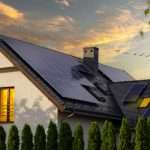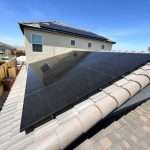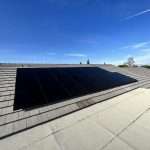Solar panels are a big way to save on electricity costs and work well even during cloudy days. However, there is still some argument over whether solar panels can produce energy during overcast skies.
This blog post will delve into the pros and cons of solar panel use on cloudy days. We will also look at real-world examples to help you decide if solar panels are right for you.
How Do Solar Panels Function on Cloudy Days?
A solar panel is forced up of photovoltaic cells (PV cells). These PV cells take sunlight and convert it into an electric current. The electric current can then be used to power your home or business.
Even on gloomy days, there are still UV rays present. These UV rays can penetrate clouds and reach the PV cells. However, because there are fewer UV rays on cloudy days, PV cells do not produce as much electricity as on sunny days.
In addition, the output of solar panels also depends on the type of clouds present. Thick clouds will block more sunlight than thin ones. As a result, thick clouds will significantly impact the number of solar electricity panels produce.
Finally, the temperature can also affect how much electricity is produced by solar panels. Colder temperatures tend to increase the output of solar panels, while warmer temperatures decrease output.
While solar panels may not produce as much electricity on cloudy days,they can still generate enough to cut down your energy bills!
The Benefits of Having Solar Panels During Cloudy Days
Solar panels are a great way to generate electricity, even on cloudy days. Many people think solar panels only work when the sun shines, but that’s not true. Solar panels can still generate electricity on cloudy days, though not as much as on sunny days.
There are a few reasons why solar panels work on cloudy days.
First, solar panels are silicon, a material that can absorb light even when it’s not directly hitting it. Second, solar panels are designed to capture a wide range of wavelengths of light, including those that penetrate clouds. Finally, the electrical current generated by solar panels on cloudy days is typically lower than on sunny days, but it’s still enough to power most homes and businesses.
So don’t worry if it’s cloudy outside – your solar panels will still work hard to generate electricity!
How to Maximize the Utilization of Solar Panels During Cloudy Days?
Even on cloudy days, solar panels can generate electricity. They will still generate some electricity even on overcast days. However, there are a few things that you can do to maximize their output during these times.
First, make sure that your panels are clean. Dust and dirt can reduce the amount of sunlight that reaches the photovoltaic cells, reducing the amount of electricity produced.
Second, consider installing a sun tracker. This device helps to ensure that the panels are always positioned at the optimum angle to capture as much sunlight as possible.
Finally, consider connecting your panels to a backup battery. This way, you can store any surplus electricity during periods of low illumination.
By following these tips, you can help to ensure that your solar panels continue to provide power even on cloudy days.
Conclusion
The cloudy day myth has been debunked! Solar panels do work during cloudy days. Although they may not produce as much power as they would on a sunny day, solar panels will still generate some electricity from the sun’s rays. So don’t let overcast skies keep you from going solar – your home can still be powered by the sun even when it’s hidden behind clouds.
Arc Energy Solutions. is at the forefront of solar panel technology, and we’re changing how people think about this renewable resource. We are committed to maintaining our customers with fantastic customer service and competitive prices, contact us now to learn more about how we can help you go solar!










